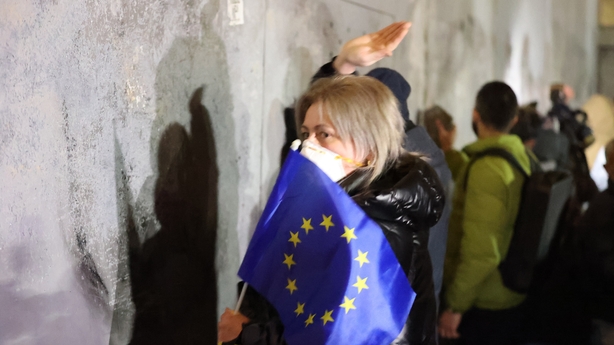Georgian police have fired water cannons and tear gas on demonstrators on the second day of protests against the government's decision to delay EU membership talks.
The Black Sea nation has been plunged into political crisis since contested parliamentary elections last month, with thousands rallying outside the parliament in Tbilisi following a violent crackdown by riot police against protestors a day earlier.
Police deploying water cannons and pepper spray moved against thousands of pro-European protesters massed in the centre of Tbilisi after Georgia's ruling party said it was halting EU accession talks until 2028.
Pro-EU Georgians gather for second night of protests against accession freeze
EU accession is overwhelmingly popular in Georgia according to opinion polls, and the move saw thousands protest outside the parliament building in Tbilisi on Thursday, with riot police using water cannon and gas to disperse them.
Protesters carrying Georgian and EU flags pressed towards the Soviet-built fortress-like parliament building and hurled fireworks at police officers trying to disperse them.
Elene Khoshtaria, a leader of Georgia's largest opposition party, the Coalition for Change, had her hand broken during Thursday's crackdown, which she compared to police tactics in Russia and Belarus.
Speaking to Reuters with her arm held up by a sling, she said: "We are not going to give in, we are not going to give up. But I think the international community should think how to support people who really believe in European values."

The freezing of application talks has been met with widespread anger in Georgia, which has the aim of EU membership written into its constitution.
Hundreds of serving employees of the country's foreign, defence, education and justice ministries have signed open letters denouncing the freeze in talks as unconstitutional.
A string of private universities have said they are suspending studies amid the unrest, while business groups have called for the government to review its stance.
The ruling Georgian Dream party, which won almost 54% of the vote in an October election that opposition parties say was rigged, said on Thursday that it was freezing membership talks over what it said was EU "blackmail" of Georgia.

